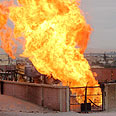Egyptian company EMG, which supplies natural gas to Jordan,
Syria,
Lebanon
and Israel,
has been constantly delaying the renewal of the gas supply, which was halted following an explosion
in the gas pipeline in early February.
Therefore, the source added, "it would be difficult to renew the flow of gas to Jordan and Israel without causing a commotion."
The company has cited technical reasons for the delays, but a Western diplomatic source in Amman told the French news agency that the gas supply was being held up because of "political reasons due to strong Egyptian objection to gas deliveries to Israel, especially among the Arabs (Bedouins) in Sinai."
Energy Resources
Doron Peskin
Energy Minister Jibran Bassil slams Israel's 'aggression' over gas issue, warns of instability ahead. Lebanon has enough power to react, he says
Meanwhile, the Egyptians appear to be taking advantage of the situation to raise prices. The French news agency quoted a Jordanian source as saying that Egypt had officially announced that it would not renew the supply of gas to Jordan before it increases the gas price.
According to the source, Egypt sold the gas to Jordan for cheap prices and is now interested in raising them.
It should be noted that the prices of gas in the Middle East are lower than global prices due to low transportation costs, but the price of gas Egypt sells to Jordan is lower than the price of gas sold to the Israel Electric Corp.
Internal dispute in Egypt
Egypt has been supplying 40% of Israel's natural gas since 2008 – raw material for the production of 20% of the country's electricity – through the state-owned EMG company, businessmen Hussein Salem of Egypt, Yossi Maiman of Israel and Jewish American Sam Zell, and Thai energy company PTT.
The Egyptian opposition openly objects to the gas deal signed between the two countries in 2005.
The Muslim Brothers are against any relations with Israeli, while the liberal opposition is demanding a reevaluation of the agreements – both with Israel and with Arab states – because of the price.
It appears that Egypt's transit government is not politically strong enough to face the army which is interested in honoring the agreement, and cancel the gas deal, but isn't capable of confronting the opposition and insisting on continuing the supply either. The current situation, in which there is no supply, is convenient for the government.
Yossi Maiman's Merhav company, which owns part of EMG, declined to comment on this report.
Tani Goldstein contributed to this report
- Follow Ynetnews on Facebook

Sinai pipeline blast, February
Photo: AFP
מומלצים















